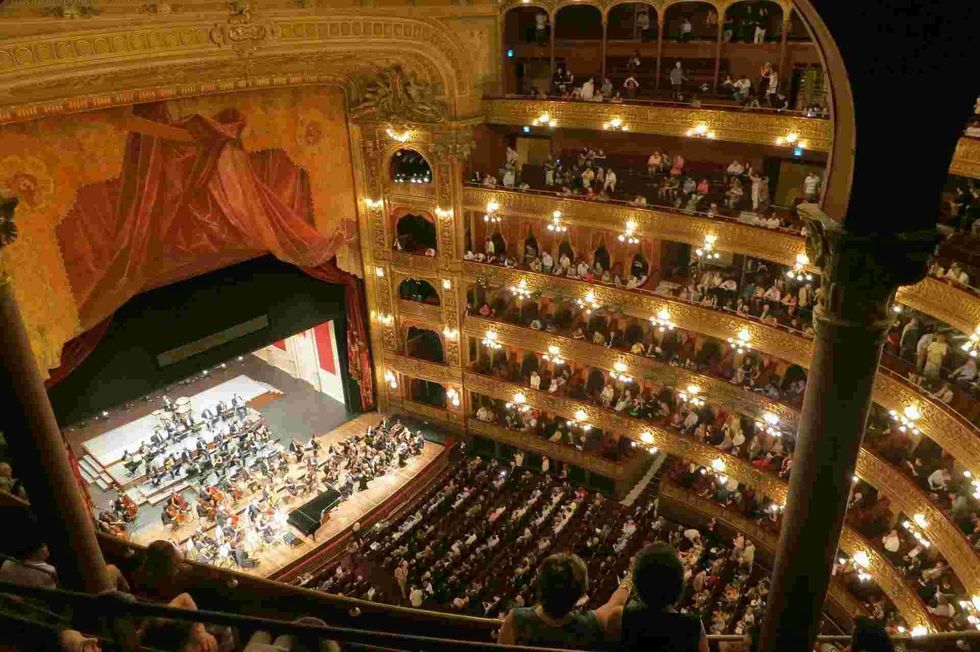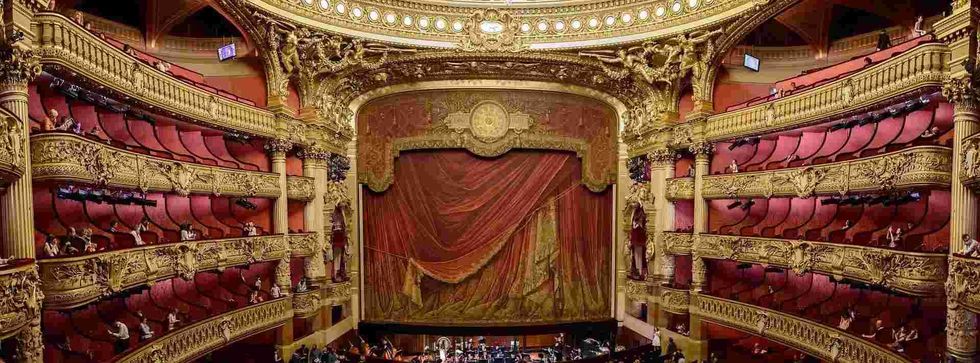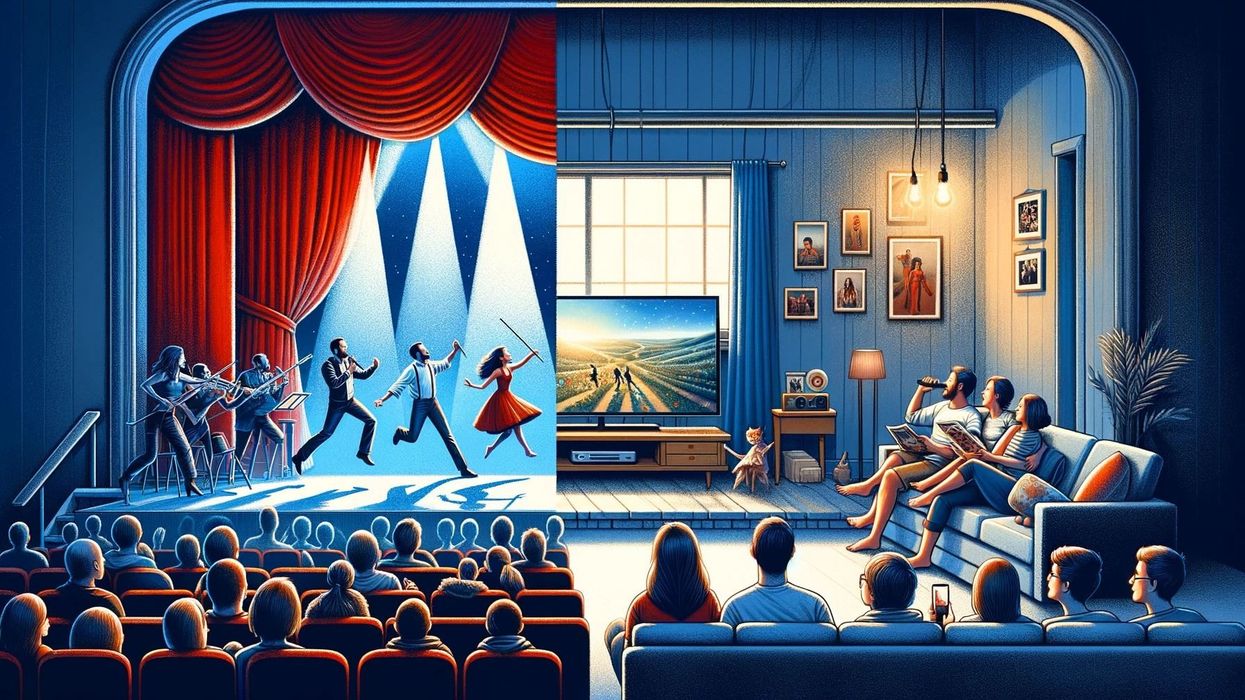19th-Century Theatre Facts: Curious Stage Plays Details Revealed

The concept of theater can be traced back to the primitive age and is still popular today.
The word drama means a style of writing or a genre. A drama can be performed in a movie, radio, television, or theatre.
Dramas are written as scripts, and an actor plays a character in a script. The drama is played out on stage in front of an audience in a theater. So, drama is referred to as a script, and theater is the performance of the role written in a script.
Long before television came, people usually went out to watch a drama in a theater. So, a stage performer entertains you on a stage, hoping to grab everyone's attention. Many stage plays were performed written by famous writers.
From the time the theater started till now, it went through many cultural changes and movements. If you enjoyed reading our article, you could also check out 19th century London facts and 1960s cars facts.
19th Century Theatre Genres
When you're deciphering a piece of literature, it's valuable to know something about the time frame during which the work was composed. This information can assist you with distinguishing the patterns, foresee themes, and know the forms.
If you know about the history of the theater, you will have a superior shot at understanding the setting of a play before you even start reading it. Acting styles in the mid-nineteenth century were inclined to overstated motions, bombastic impacts, fantastic drama, physical theatre comedy, musical theatre, and extraordinary costumes.
From the mid-19th century, a more natural form of acting came, and entertainers were relied upon to introduce a more conscious character articulation. New plays were taken from social life, such as domestic issues and social class issues. During the Victorian era, only popular novels were adapted for stage play.
In the 19th-century, the theater was one of the most popular forms of entertainment.
The parody was one more most loved form in the nineteenth-century major theater plays. The plays of William Shakespeare, particularly those in the standard routine of the actual theaters, were a most loved objective. Actors were acknowledged for their burlesque and comedic acting talents.
The key developments in 19th -century theater were design and innovation. The theater production houses used stage lighting instead of limelight and gaslight.
The limelight is actually a lime block that was heated to glow through an oxyhydrogen firelight. The light was then reflected with the help of mirrors which produced a very incredible light. The interiors of the theaters were improved during the 1850s, by decorating it with a stall set up for sitting instead of the pit and ornate decoration.
One of the most incredible set designers during the nineteenth century was Bruce 'Sensation' Smith. He is responsible for designing some of the awe-inspiring sets in the late Victorian era. He worked for Anna Pavlova, Sir Henry Irving, Gilbert, Ellen Terry, and Sullivan.
In the 19th-century, theater crowds had acquired a reputation of being raucous, noisy, and uncultured. The enhancements done to theaters in the later 19th-century empowered the high society and middle-class supporters to go to plays. The crowds were calmer, sophisticated, and less inclined to cause disturbances during the performance. On the royal boxes sat the high-class.
The 19th-century theater genres are Shakespeare and classic English drama, Melodramas, light comedies, operas, French farces, and pantomimes. From the 1860s, French operettas kept on being well known, along with Victorian burlesque.
Even in Latin America, major European influences on theater can be seen. It blended with the local interest, like some Latin American theatre genres inspired by Spanish dramas Zarzuela and Sainete. Zarzuela was accompanied by dance, dialogue, and song. Sainete was accompanied by local music, natural language, colorful costumes, and beautiful scenery.
Another type of genre that was famous during the 1800s was melodrama. Romantic plays created an atmosphere, a feeling, and a mood. The Romantic playwrights accepted that no subject seemed inappropriate to act on stage. They constructed struggle in their plays between the characters' spiritual and innovative wishes and their actual ineptitudes.
How plays were composed during the 1800s was additionally evolving. There were three fundamental sorts of plays: romantic plays, melodramas, and well-made plays. The Romantics dismissed every one of the current guidelines, expressing that if the playwrights were a genuine virtuoso, the individual required no principles, for example, those that had ruled the neoclassical era.
Some of the influential playwrights of the 19th-century are William Shakespeare, Charles Dickens, and Oscar Wilde.
Shakespeare's plays were full of humor and gives popular entertainment. Shakespeare's play 'A Midsummer Night's Dream' was one of the famous plays.
Popular Dramas Of 19th Century Theatre
With the end of the eighteenth century, many political and social events brought changes to European theater. The nineteenth century was a vital time for plays and dramatists all around the world.
Nineteenth-century playwrights were taking new bearings in their plays, and new dramatists took risks composing great plays. Women were beginning to show up as lead roles in the theater.
In the 18th and early 19th-century, people considered the acting profession as sinful. Only by the end of the 19th-century, the acting profession was taken as a respectable job. Those in the acting profession were required to be independent, strong-willed, adaptable, and determined. Drama in the 19th-century was dominated by Henry Irving, Beerbohm Tree, and Charles Kean.
The late nineteenth century saw a period of tremendous change in American theater. It was a period of massive development in America, particularly in New York City. Americans had more time to relax and better ways of life, and they looked at the theatre as a part of adding laughter, sentiment, and joy to their life.
American theater comprised musical theater and physical theater. During the outbreak of the civil war, American theater was affected moderately. Some theaters were even closed during the civil war.
The growing transportation system in the United States permitted actors and actresses to tour, carrying theatre performance centers to many towns and urban areas that had never experienced it. As the number of inhabitants in the nation increased, the number of theaters in the area increased. Major theatres were built from the 1850s till the end of the 19th-century.
In the early 19th-century, on account of the Licensing Act, plays were permitted to be shown uniquely at two London theatres: Covent Garden Theatre and Drury Lane Theatre. Melodrama and burlesque were famous for their styles.
The Drury Lane Theatre and Covent Garden Theatre were the best-designed theaters of that time. Lord Chamberlain's office allowed staging Burlettas.
With Lord Chamberlain's Office permission led to the emergence of the modern west end play. 'The Innkeeper of Abbeville' was the first modern west end play. After the second world war, the west end play was famous in the commercial sector.
In the 1840s, stock companies had enough money and went on to produce on their own. Stock companies paid the actors a fixed salary.
There was an enormous development in theatrical entertainment in the mid-nineteenth century that made the licensed theatres' system impossible, which is why theatres had jumped up across London. In 1843 the Licensing Act was canceled, empowering other theaters to present plays.
Popular dramas or famous plays of the 19th-century are 'Uncle Tom's Cabin', 'The Hunchback of Notre Dame', 'The Importance of Being Ernest', 'Lady Windermere's Fan', and 'The Father'. Famous novels were staged as a play often, too.
'Uncle Tom's Cabin' is a famous novel written by Harriet Beecher Stowe. The novel was a story about the evils of slavery. 'Uncle Tom's Cabin' became very popular during the civil war. In some places every day, it ran four shows in New York City.
Victorian melodrama is evident in the acting style and dialogues. The Queen's Theatre staged the plays of successful writers like Charles Dickens 'Oliver Twist.'
Also, William Shakespeare's famous novel 'Romeo and Juliet' was enacted on stage. It was one of the famous stage play people loved to watch.
Effect Of Steam Engine Affect The Theatre During The 19th Century
The nineteenth century was the age of a genuinely famous theater and opened new theaters. The 19th-century evolved to fulfill a developing interest for theatres and amusement from the specialists who overflowed into the significant urban areas as the industrial revolution grabbed hold.
For theater, as most of society, the 1800s were a period of progress. Technology was changing all through society, and new inventions influenced how it created theater.
Europe's farming economy moved to an economy constrained by the big factories of the industrial revolution, the timeframe when machines supplanted hand devices in many trades. You wouldn't imagine that the invention of the steam engine would significantly affect the theater, yet it did.
Regions not having theatre ever became accessible by steam engines. European lead actors and theatrical productions started to tour their shows in America!
Theaters mainly used art technology. Steam engine filled the gap and helped the theater to become more advanced and lucrative.
Hordes of individuals moving into the urban communities in Europe needed amusement, and the individuals from the developing middle-class had more leisure time. Significantly more, the steam engine prompted the construction of substantial steam-powered factories, which offered jobs to many, so laborers began amassing into the urban areas. It is known as urbanization, which majorly affected theater.
Theater expanded and gained popularity. Indeed, the theater turned into an entirely trendy distraction, an authentic prevailing fashion!
By the late 1800s, theater and other live entertainment were in great demand to individuals of those times as films are to us now. This incredible prevalence of theatre brought about the development of more and larger playhouses.
After 1817, these new theaters were lit with gas, an immense improvement over the need to light the theatre with hundreds of candles. Elaborate stage machinery in melodramas and theatrical productions as well. Technical achievements lead to the scenic design of the stages.

Why was melodrama so popular in the 19th century?
In the urban communities, new theaters were built so the average crowd could partake in theater. New playwrights, for example, Guilbert de Pixerecourt and August von Kotzebue, presented the drama classification of theater and were the most influential ones. Romantic drama and restorations of the classics were additionally well-known hits at the new theaters.
Melodrama became the most well-known form of play in the nineteenth century and likely is the most performed drama in Britain, Europe, North America, and Australia. The basic theme in the 19th-century melodrama was romantic, supernatural, and exotic.
The other significant foundation impact is the industrial revolution. It's exceptionally intriguing as individuals move to cities. There must be entertainment. When individuals worked for extended hours, they preferred taking a quick trip and seeing a melodrama rather than doing something heavier. So melodrama became famous because there is an urban audience interested in this form of the genre.
In the agricultural period, individuals lived in the open country, maybe more charmingly or respected in a more admired manner. So you frequently find in melodrama that it's the villagers who are saints and the rich assistants or awful landowners typically put upon them.
Later in the century, when you get to see plays like 'The Bells', which was a melodrama, Henry Irving played Mathias, the hero is both the reprobate and saint. The interest is substantially more on his mental circumstance than any clear interpretation of good versus evil.
Assuming you begin searching for exceptional cases, you can easily observe them, and a few dramas are very perplexing in how they foster their essential characters.
Here at Kidadl, we have carefully created lots of interesting family-friendly facts for everyone to enjoy! If you liked our suggestions for 19th-century theatre facts: curious stage plays details revealed, then why not take a look at aboriginal music facts: why is music so important in their culture?
or 7 amazing Antonio Lopez De Santa Anna facts that you should know.
We Want Your Photos!
More for You
See All
Bachelor of Science specializing in Botany, Master of Science specializing in Clinical Research and Regulatory Affairs

Sridevi ToletyBachelor of Science specializing in Botany, Master of Science specializing in Clinical Research and Regulatory Affairs
With a Master's degree in clinical research from Manipal University and a PG Diploma in journalism from Bharatiya Vidya Bhavan, Sridevi has cultivated her passion for writing across various domains. She has authored a wide range of articles, blogs, travelogues, creative content, and short stories that have been published in leading magazines, newspapers, and websites. Sridevi is fluent in four languages and enjoys spending her spare time with loved ones. Her hobbies include reading, traveling, cooking, painting, and listening to music.
Bachelor of Arts specializing in Economics

Gowri RaoBachelor of Arts specializing in Economics
With a bachelor's degree in Economics from Krea University, Gowri is a highly skilled data analyst and an expert in regression and causation modeling. Her interests in economic trends, finance, and investment research complement her professional expertise. In addition to her professional pursuits, Gowri enjoys swimming, running, and playing the drums, and she is also a talented tutor.
Disclaimer
1) Kidadl is independent and to make our service free to you the reader we are supported by advertising. We hope you love our recommendations for products and services! What we suggest is selected independently by the Kidadl team. If you purchase using the Buy Now button we may earn a small commission. This does not influence our choices. Prices are correct and items are available at the time the article was published but we cannot guarantee that on the time of reading. Please note that Kidadl is a participant in the Amazon Services LLC Associates Program, an affiliate advertising program designed to provide a means for sites to earn advertising fees by advertising and linking to Amazon. We also link to other websites, but are not responsible for their content.
2) At Kidadl, we strive to recommend the very best activities and events. We will always aim to give you accurate information at the date of publication - however, information does change, so it’s important you do your own research, double-check and make the decision that is right for your family. We recognise that not all activities and ideas are appropriate for all children and families or in all circumstances. Our recommended activities are based on age but these are a guide. We recommend that these ideas are used as inspiration, that ideas are undertaken with appropriate adult supervision, and that each adult uses their own discretion and knowledge of their children to consider the safety and suitability. Kidadl cannot accept liability for the execution of these ideas, and parental supervision is advised at all times, as safety is paramount. Anyone using the information provided by Kidadl does so at their own risk and we can not accept liability if things go wrong.
3) Because we are an educational resource, we have quotes and facts about a range of historical and modern figures. We do not endorse the actions of or rhetoric of all the people included in these collections, but we think they are important for growing minds to learn about under the guidance of parents or guardians.







